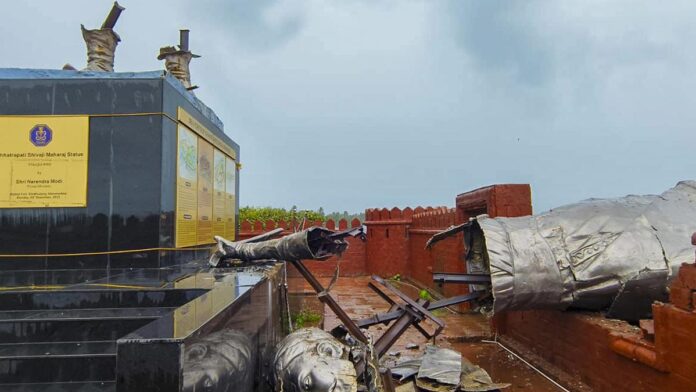
On August 26, 2024, a giant statue of the Maratha warrior king Shivaji Maharaj at the Rajkot Fort in Malvan collapsed. The Opposition was quick to pounce, alleging corruption in the statue’s construction. File
| Photo Credit: PTI
Maharashtra, the land of Chhatrapati Shivaji Maharaj, is a relentless battleground of political activity. In the two years since I started reporting on the State’s GPS — governance, politics, and society — there has not been a dull day. New controversies often arise before the previous ones have even begun to cool down.
The Opposition’s vigorous efforts keep issues in the spotlight, while the ruling dispensation is never far behind in delivering rebuttals, whether through traditional media or a post on X.
The political landscape here is markedly different from Telangana, where I reported from 2015 to 2022. In Telangana, the K. Chandrashekhar Rao-led TRS (now BRS) government dominated the narrative, leaving little room for dissent, as the Opposition was weakened by defections and had minimal representation in the Assembly. Reporting there felt like covering a monologue, with few challenges to the ruling party’s agenda. The Opposition parties struggled to make their presence felt. In contrast, the Opposition MVA in the western State is vocal, challenging the government at every move.
Amid this storm, it is easy to lose sight of the bigger picture. The issues that dominate headlines one day can fade from public consciousness almost as quickly as they arise. This is not just a symptom of the State’s volatile political climate, but a reflection of the evolving news cycle.
Grave matters often do not receive the follow-up they deserve. As journalists, we try to keep pace, but the flood of news can sometimes wash away our resolve to revisit stories once they are off the front page. It is a challenge to ensure that important issues are not lost in the noise. I have found myself grappling with this issue more than once. However, we often write long-form pieces on these issues, hoping to provide the depth and context that gets lost in the rush.
One of the first controversies I covered after shifting to Maharashtra was Vedanta Foxconn’s decision to open a semiconductor plant in neighbouring Gujarat instead of Maharashtra. The Opposition criticised the Eknath Shinde-led government for its perceived failure. This story dominated the headlines, and journalists were caught in a whirlwind of press conferences, statements, and counter-statements. But as with so many other issues, the noise eventually died down. The media moved on, as did the politicians, leaving behind a trail of unanswered questions.
The latest issue where we journalists lost track of follow-up is the alleged sexual assault of two kindergarten girls in Badlapur. The streets were filled with angry voices demanding justice, and the media played its part. But then, on August 26, a giant statue of the Maratha warrior king Shivaji Maharaj collapsed. The Opposition was quick to pounce, alleging corruption in the statue’s construction. The sexual assault case was suddenly overshadowed. This is a stark reminder of how quickly things can change, and how easily the media’s attention can be diverted. The role of the Opposition cannot be overstated, as it keeps the government on its toes and, by extension, keeps us journalists on ours.
Amid the cacophony of daily news, some issues refuse to fade away. Whether it is the ongoing battle over reservations for the Maratha community or the perennial debate over development, these stories keep coming back, demanding attention.
We continue to distil through the noise and deliver what matters while waiting — for the next big event, twist, and revelation. This constant churn is exhausting, but it is what makes reporting on Maharashtra’s GPS so rewarding.
Published – October 04, 2024 01:43 am IST










![Best Weight Loss Supplements [2022-23] New Reports!](https://technologytangle.com/wp-content/uploads/2022/12/p1-1170962-1670840878.png)




